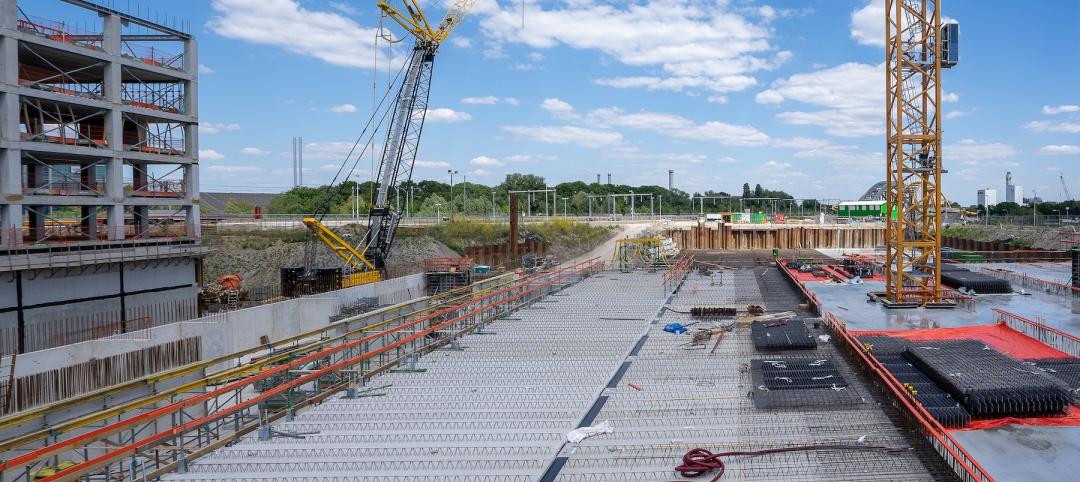The National Council of Architectural Registration Boards (NCARB) Board of Directors has announced their endorsement of the concept of an additional, structured path that leads to licensure in a U.S. jurisdiction.
The new path—licensure upon graduation from an accredited program—would integrate the rigorous internship and examination requirements that aspiring architects must fulfill into the years spent completing a professional degree in architecture.
The concept was designed by a distinguished group of volunteers convened by NCARB, which recommends national architect registration standards, called the Licensure Task Force.
This group, which was initially formed in mid-2013, is headed by NCARB’s Immediate Past President Ron Blitch of Louisiana, and it includes former and current leaders of NCARB, by the National Architectural Accrediting Board (NAAB), the American Institute of Architects (AIA), the Association of Colleges and Schools of Architecture (ACSA), and the American Institute of Architecture Students (AIAS), as well as interns, recently licensed architects, program deans and instructors, and jurisdictional licensing board representatives.
A Progressive Path
Describing the work of the Licensure Task Force, NCARB CEO Michael Armstrong said, “NCARB is engaged in streamlining and simplifying the licensing process for aspiring architects, and we are actively re-engineering all elements of the architectural licensing process—education, experience and examination—to focus on facilitation of licensing.”
“This additional path to licensure is another concrete step to reimagining and reconfiguring each part of the process while upholding the rigorous standards needed to protect the public’s health, safety and welfare,” he said.
This progressive concept was borne of research and development efforts by the Licensure Task Force, with leaders from diverse segments of the architectural community to analyze each component of the licensure process to identify overlaps and redundancies to existing programs.
Now beginning the second year, the Licensure Task Force will start to identify schools interested in participating in the program. NCARB expects to issue schools Requests for Information later in the year, followed by a Request for Proposal process in 2015.
Exam Evolution
In addition to the licensure work, NCARB also announced this month that a transition plan is underway to guide the implementation of major improvements and changes to the Architect Registration Examination® (ARE®), the test that all prospective architects must take to get their licenses. The new ARE 5.0 will launch in late 2016, while ARE 4.0 will remain available for at least 18 months after the launch.
The exam is required by all U.S. states, the District of Columbia, Guam, Puerto Rico, and the U.S. Virgin Islands for initial architectural licensure by assessing candidates for their knowledge, skills, and ability to provide all services required in the practice of architecture.
About NCARB
The National Council of Architectural Registration Boards’ membership is made up of the architectural registration boards of all 50 states as well as those of the District of Columbia, Puerto Rico, Guam, and the U.S. Virgin Islands. NCARB assists its member registration boards in carrying out their duties and provides a certification program for individual architects.
NCARB protects the public health, safety, and welfare by leading the regulation of the practice of architecture through the development and application of standards for licensure and credentialing of architects. In order to achieve these goals, the Council develops and recommends standards to be required of an applicant for architectural registration; develops and recommends standards regulating the practice of architecture; provides to Member Boards a process for certifying the qualifications of an architect for registration; and represents the interests of Member Boards before public and private agencies. NCARB has established reciprocal registration for architects in the United States and Canada.
Related Stories
Market Data | Oct 14, 2022
ABC’s Construction Backlog Indicator Jumps in September; Contractor Confidence Remains Steady
Associated Builders and Contractors reports today that its Construction Backlog Indicator increased to 9.0 months in September, according to an ABC member survey conducted Sept. 20 to Oct. 5.
| Oct 13, 2022
Boston’s proposed net-zero emissions code has developers concerned
Developers have raised serious concerns over a proposed new energy code by the City of Boston that would require newly constructed buildings over 20,000 sf to immediately hit net-zero emissions goals.
Education Facilities | Oct 13, 2022
A 44-acre campus serves as a professional retreat for public-school educators in Texas
A first-of-its-kind facility for public schools in Texas, the Holdsworth Center serves as a retreat for public educators, supporting reflection and dialogue.
Building Team | Oct 12, 2022
Real estate development practices worsened impact of Hurricane Ian
A century ago, the southwest Florida coast was mostly swamps and shoals, prone to frequent flooding and almost impossible to navigate by boat.
Market Data | Oct 12, 2022
ABC: Construction Input Prices Inched Down in September; Up 41% Since February 2020
Construction input prices dipped 0.1% in September compared to the previous month, according to an Associated Builders and Contractors analysis of U.S. Bureau of Labor Statistics’ Producer Price Index data released today.
Hotel Facilities | Oct 12, 2022
Global hotel chain citizenM opens its first Chicago property and its fifth of the year
citizenM, a global chain of affordable luxury hotels, has opened its first Chicago property—its fifth opening of 2022.
Building Team | Oct 11, 2022
Associated Materials® Celebrates the Company’s Rich History, Which Began 75 Years Ago with the Founding of Alside
Since its inception in 1947, Alside® has been a leader in innovation and continues this very commitment to excellence – in people, products and services.
Standards | Oct 11, 2022
Peter Templeton named new USGBC and GBCI president and CEO
The U.S. Green Building Council (USGBC) and Green Business Certification Inc. (GBCI) appointed Peter Templeton as president and CEO.
Legislation | Oct 10, 2022
Chicago’s updated building energy code provides incentives for smart HVAC, water appliances
The Chicago City Council recently passed the 2022 Chicago Energy Transformation Code that is intended to align with the city’s goal of reducing carbon emissions by 62% from 2017 levels by 2040.
Contractors | Oct 7, 2022
Nonresidential construction spending down 0.4% in August, says ABC
National nonresidential construction spending was down 0.4% in August, according to an Associated Builders and Contractors analysis of data published today by the U.S. Census Bureau.

















